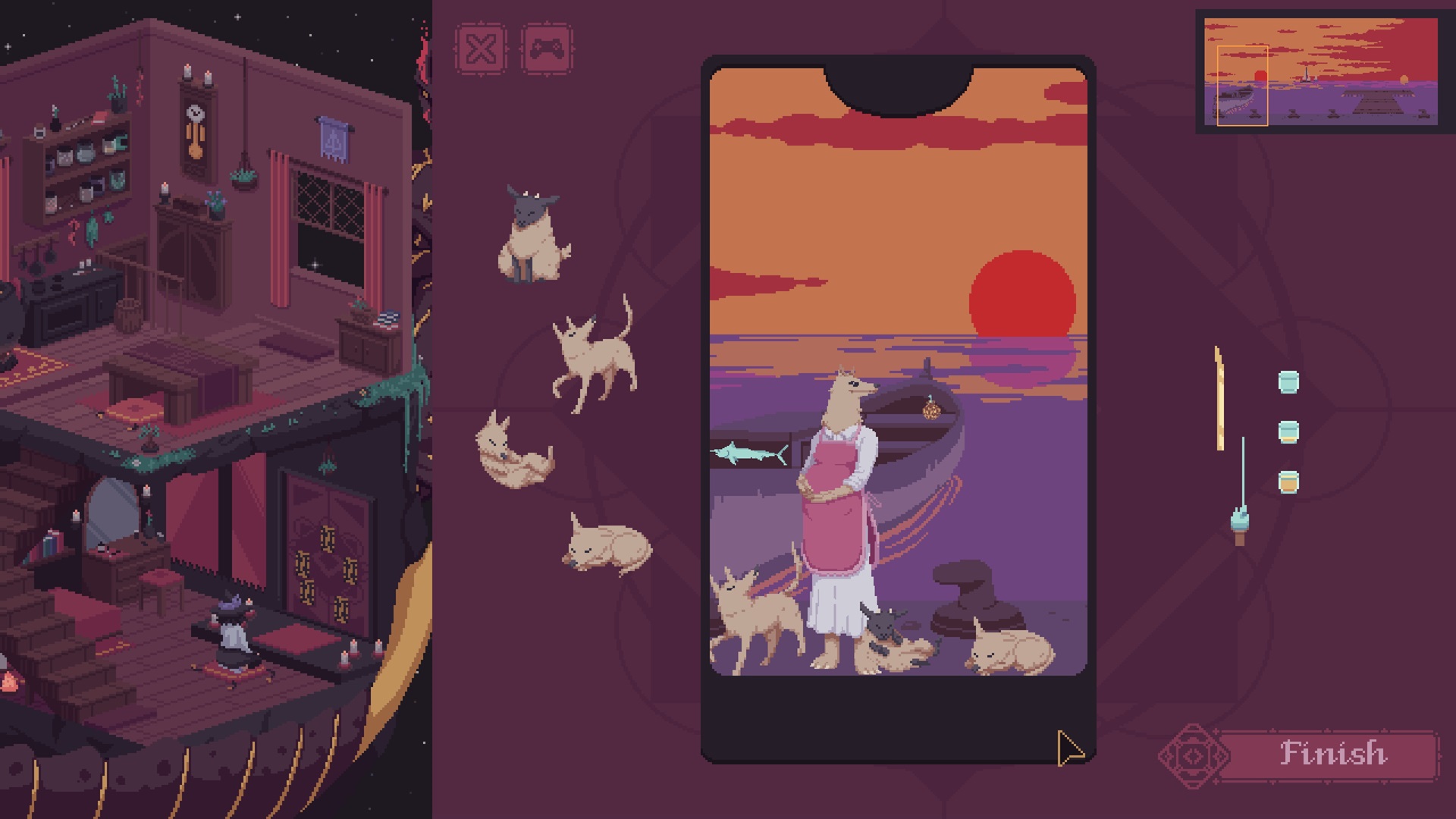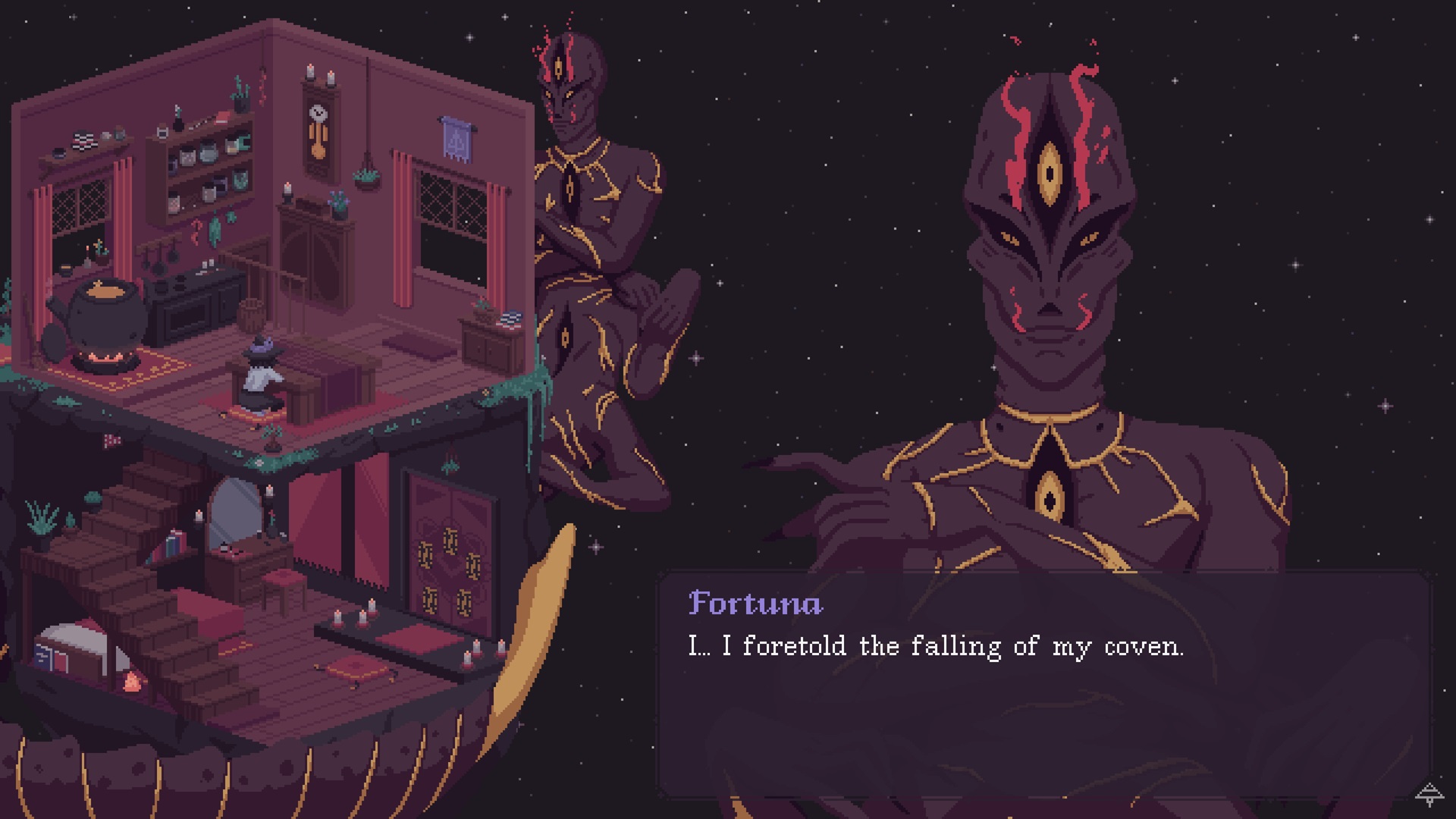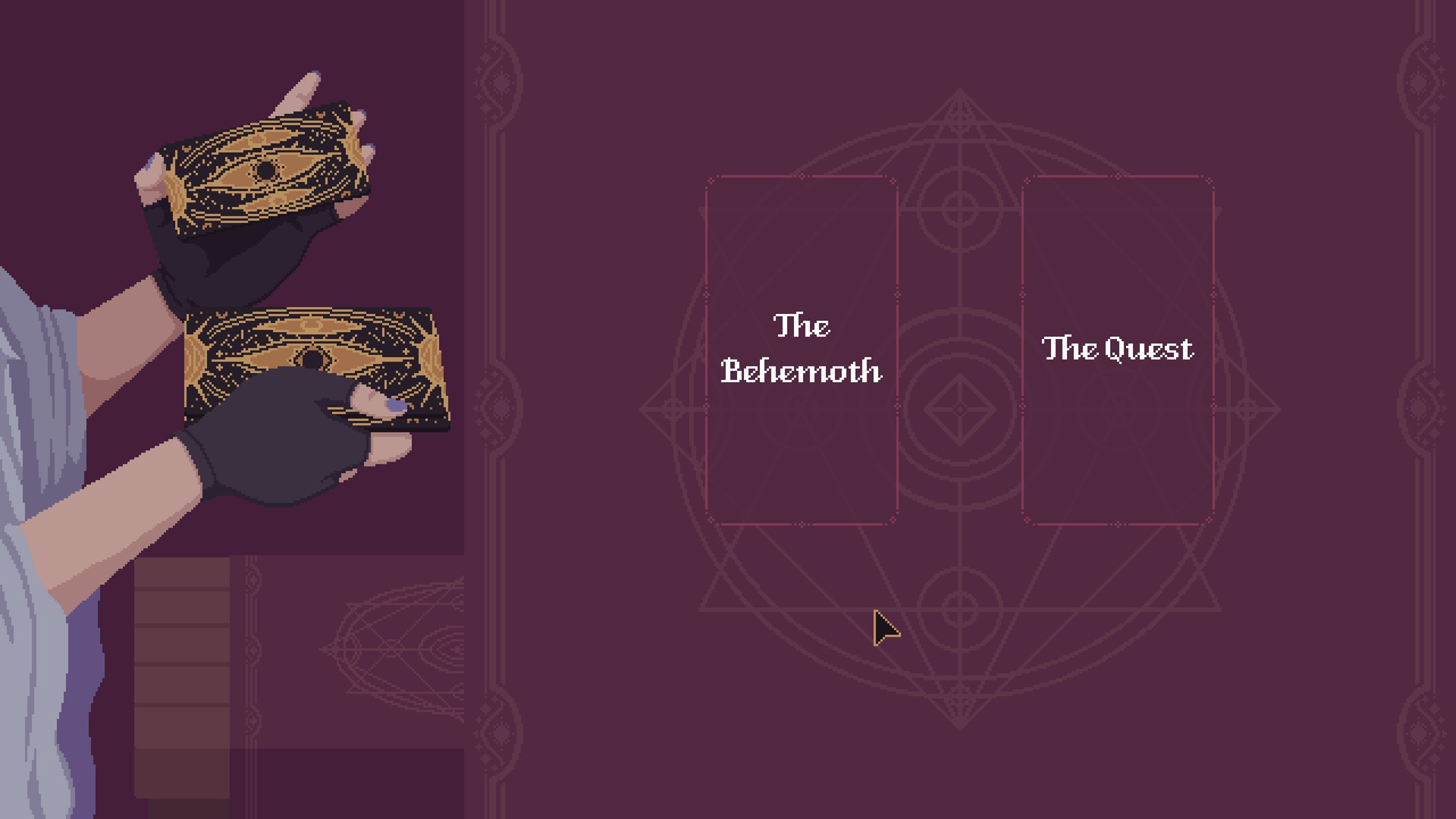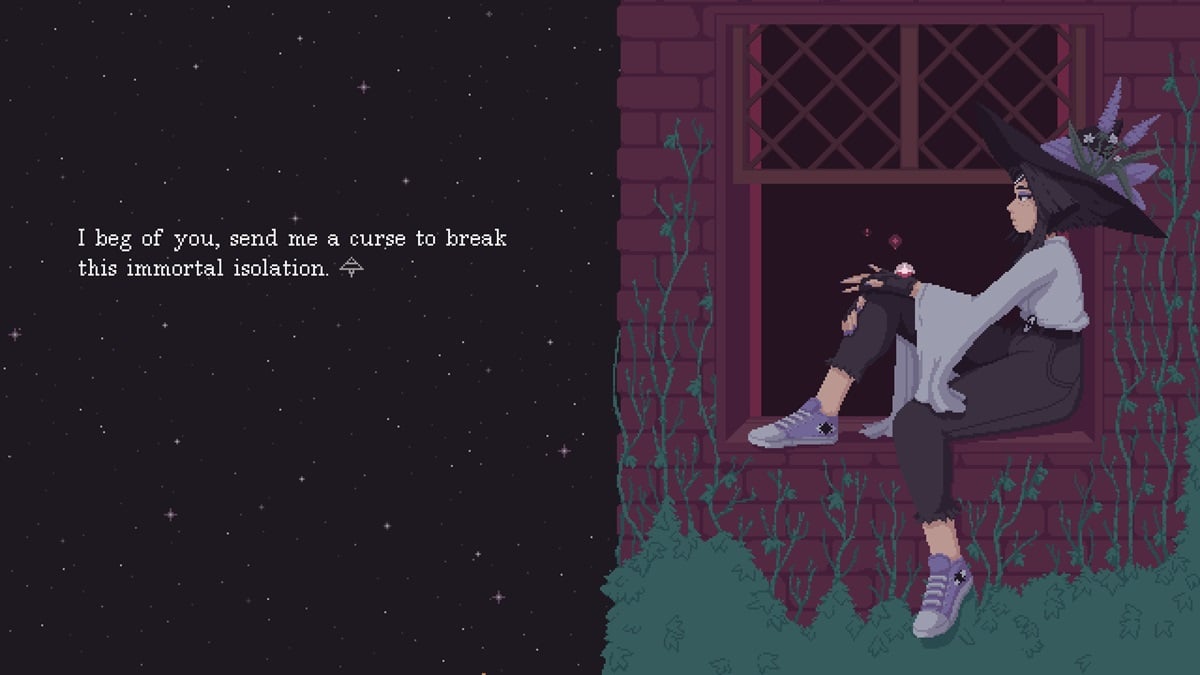Divination, specifically tarot and oracle decks, has fascinated me most of my adult life. While I don’t put much stock on the mystical abilities supposedly found in oracle decks, I’ve found the activity of drawing cards to speak on certain aspects of my life comforting and, occasionally, a useful guide.
The Cosmic Wheel Sisterhood is a game that takes that concept and makes it the core gameplay loop. Almost the entire runtime takes place in protagonist Fortuna’s home as friends come and go, but often not before getting a reading. Despite having immortal witches who alter reality, a shrimp-like behemoth aiding the protagonist, and gathering energy from around the universe for a new deck, The Cosmic Wheel Sisterhood is surprisingly grounded during the actual process of card reading.
It’s a surprising turn from developer Deconstructeam’s previous titles, The Red Strings Club and Gods Will be Watching. Those were closer to sci-fi thrillers, and while Sisterhood is also set in a world with sci-fi elements, they’re only discussed; the focus remains squarely on the mystical elements.
It results in a title that’s as cozy as it is fascinating with how it delves into topics like determinism, mysticism, and what meaning life could have. The universe is as absurd as its endearing story, and it depicts its oracle readings earnestly. Readings might matter more in-game than in real life, but that doesn’t stop it from capturing how it feels hanging out with friends and whipping out a deck for a reading.

Taking what you will from the cards
The Cosmic Wheel Sisterhood follows a divination witch named Fortuna who has spent 200 years under house arrest for foretelling her coven’s doom. In this setting, witches are immortal women who travel throughout the universe, so naturally, Fortuna’s sentencing leaves her drifting in space stuck inside her home.
With another 800 years left in her isolation and desperate for human contact, Fortuna makes a pact with a demon-like creature known as a behemoth to loosen her sentence. The behemoth, named Abramar, even lets her craft a divination deck that draws energy from around the universe.
Wild premise aside, the gameplay loop for most of The Cosmic Wheel Sisterhood is surprisingly mundane. Much of the runtime involves inviting friends over, talking to them about their issues, and giving them a divination reading. Topics range from checking in and relationship drama to how becoming immortal affects your perspective on the mortal world.
My roommate and I do the same every Thursday morning to gauge what the next week has in store for us. We often draw cards, touching upon specific areas in our lives, and use them as an aid for the near future.
It’s a parallel between life and games that happens rarely enough that it’s special when it does. The impacts our cards have might be more substantial in a game all about readings when compared to real life, but the parallel is still there.
Even if some developments escalate the story’s plot in the second half, The Cosmic Wheel Sisterhood sells the idea of hanging out with friends and doing tarot excellently.

Everything is a matter of perspective
Something fun about fortune telling is seeing how the reader interprets cards. Different decks carry varying connotations with each reader adding flavor to it. Some will ask you to put your energy into the deck and draw a set of cards, and others might focus on setting a mood with incense. Everyone also seemingly shuffles cards differently, with my preferred style resembling Fortuna’s in The Cosmic Wheel Sisterhood.
The ritual remains fundamentally the same: the reader and listener sit across from each other and ask the cards a question. The Cosmic Wheel Sisterhood always has these related to specific topics, but it can be as general as asking how the next week will go. Whatever cards get drawn, the answer is meant to be less of a definitive fate, and more of a guideline for how future events turn out if you stick to the same course you’re currently on.
That is the biggest difference between readings in real life and The Cosmic Wheel Sisterhood, because Fortuna’s readings are what will happen in the future. Her cards are the truth, and not something suggesting a truth like I consider real-life decks to be.
Although Fortuna’s cards draw from the universe’s energy, it’s not all that different from most others. A great example would be my preferred oracle deck, Ariana Osborne’s The Daemon Tarot. Despite the name, it’s not a tarot deck, but each card often has a specific enough reading that satisfying readings can be given with a single card.
Multi-card spreads also help sometimes, and it’s the one thing I wish appeared more in TCWS. While the point of Fortuna’s fortune-telling ability is getting an entire reading from one card, it would have been nice to see things like clarifying cards to add some extra flavor to readings. Conversations in the game often cover multiple topics, so I enjoyed getting the choice of where to put a card if multiple options presented themselves.
As this game revolves around building a fortune-telling deck and giving readings, there is a random element to it. Fortuna shuffles her cards, meaning any created card can be drawn, leaving some level of choice up to the game.

Letting the cards guide you
No matter how casual the conversation before was, there’s always a building tension when shuffling cards. However literally you take cards, there’s still a want for positive outcomes for yourself or if the reading’s for a loved one.
It’s a contrasting sensation that comes with not knowing cards get drawn. The Cosmic Wheel Sisterhood nails this, because even if Fortuna’s deck is her creation, the odds are random if a positive card gets drawn. That’s what sold me on its implementation of tarot in the first place because there’d be something lost if you just chose which card to use.
I never played a game where part of the appeal comes from surrendering some control to the game, trusting it to make the best decision possible for its characters. It’s nerve-wracking and tense, but exciting with the payoff coming from various meanings that can be derived from a chosen card.
If anything, the game is somewhat less tense than actual draws since Fortuna’s deck is significantly smaller than many real-life counterparts. The Daemon Deck has 69 cards and the traditional tarot has 78 cards. A smaller deck works in TCWS‘ favor since its brisk runtime makes a large deck overwhelming. It’d also detract from its primary goal of being a narrative-driven game.
The Cosmic Wheel Sisterhood isn’t one-to-one with how I deliver divination readings, but it nails the emotional element behind them. That coziness contrasts with a slight tension and the casualness it’s all done with. People take what they will from the cards laid out, leading to surprisingly intimate moments when readings touch on a specific area in someone’s life.
Divination has led to many fascinating and personal conversations, ranging from career options to romantic relationships to whether certain friendships are worth pursuing. The Cosmic Wheel Sisterhood transferred that personal level into a wonderful game, and I couldn’t be happier for its existence.













Published: Apr 15, 2024 7:07 PM UTC